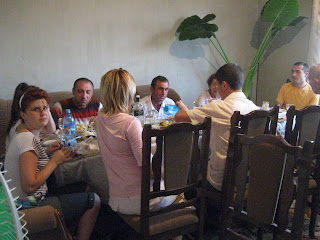Where were you in 1988? It seems light years away, doesn’t it? Now I find myself sitting in the home of a woman Dave and I just met in Armenia. She is an English teacher in Dilijan where we’ll live for the next 2 years, and she invited us to dinner along with another Peace Corps volunteer who will be teaching English in her school. We are joined by a local history teacher who speaks no English. By the end of the evening, we’ve heard of the horrors of the 1988 earthquake which killed thousands of Armenians and was soon followed by war with Azerbaijan, the Armenian’s neighbor after the fall of the Soviet Union.
Our new friend was studying and working on her teaching credentials in 1988 and also working in a factory. She painted a brief picture of her experience during the years during and after the earthquake which occurred primarily in Spitak and Gyumri, Armenia, basically ruining these cities. Imagine feeling the ground shake without warning, the machine on which you are working vibrating and the lights flickering off. Your world collapses into a chaotic abyss and the next few months and years are filled with devastation, war and death.
Our hostess lived through those times with her parents. For part of the time, her family fled to Russia with many other Armenians. She told of her home being in total shambles and disarray and needing extensive repair. Even so, after 5 years of tragedy, horror, hunger and displacement, the family returned to Armenia to rebuild their lives. Our hostess remembers the aid offered by the US, European countries and others. She remembers the clothes sent by Russia with sleeves missing or only 1 pants leg present. She recalls the terrible times, yet smiles with positive thoughts.
 |
| Memorial to Armenians killed in WW II Kotayk, Armenia |
This Armenian woman survived, her parents and siblings lived, and now 23 years later she relates portions of her story to us. The history teacher at our gathering provided pertinent historical details covering the war which soon followed and added to the earthquake’s destruction. The Armenians were expected to be easy targets due to the losses of life wrought by the natural disaster, however, the Armenians are resilient and strong. They had already survived war, the genocide of 1915-17 and other horrors. They were not ready to succumb and become over powered again. Now today this woman is a well- educated teacher who works hard to help her students learn English. She has lived through much to achieve what she has.
 |
| Genocide Memorial Museum in Yerevan, Armenia memorializing victims of first Genocide of the 20th century |
 |
| Hard- working Armenian woman tending her family's garden |
As we sit in her apartment together, our new friend expresses what she thinks of her country and of life in general and says it is currently perfect, just perfect. After her life of living in a poverty-ridden, war torn country and suffering so much loss in her life, she now sees beauty and happiness. Shocked to hear the story from our parents about sending money to “starving children in Armenia” during WW I, she could only speculate as to what these offerings of help might have meant to the Armenian people attempting to save their country.
We felt numbed yet inspired by this woman who lived through the imagery we received from television during the 1988 earthquake. We felt empathy for her relatives who suffered yet survived the wars and the genocide. For this and countless other experiences, we are grateful to the US Peace Corps for the opportunity to meet people in other parts of the world who share their world with us--the good, the bad, the horror and the hope. Through this exchange, our world becomes smaller and our understanding of people worldwide grows. So let it be, that we impact people positively by sharing ourselves, our knowledge, and our culture. In turn, we will share what we learn about Armenia with our contacts in the U.S. That is our aim. That is our mission as US Peace Corps volunteers in Armenia. Judy and David














